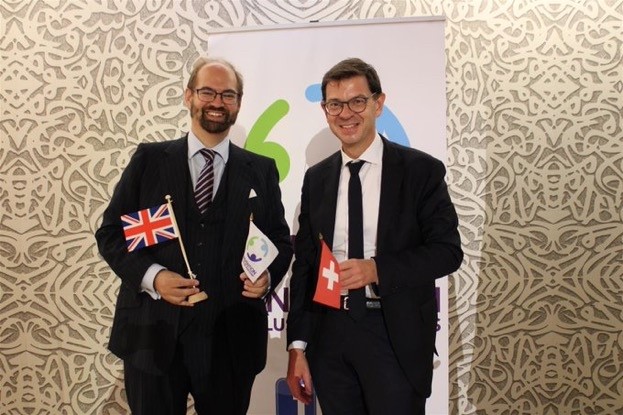22nd September 2021 Geneva, Switzerland
Disarmament blog: the UK Presidency of the Convention on Cluster Munitions

Yesterday we wrapped up the Second Review Conference of the Convention on Cluster Munitions (CCM). It’s been an unusual meeting, to say the least. We were supposed to gather in Lausanne in November last year. Of course, the pandemic put paid to that; so instead we held ‘part one’ online in November, and postponed the formal decision-making part until the situation allowed. That was not until this week, when we met both in person in the Palais des Nations in Geneva and online for ‘part two’.
Under these very difficult circumstances, President Félix Baumann of Switzerland and his team, as well as our Implementation Support Unit (ISU), the Secretariat and all the interpreters and technical and conference staff at the UN have done a superb job in guiding us to a really meaningful outcome. The Lausanne Declaration and Action Plan chart a course for the next five years that will bring the world closer to ending the scourge of cluster munitions.
But the Conference took another decision closer to home, for me – which was to confirm me as President of the 10th Meeting of States Parties, to take place in Geneva on 30 August-2 September 2022. My term starts today.
We’ve set out three priorities for the UK Presidency.
First, is to step up the pace on promoting universal adherence to the Convention. The world will only be free of cluster munitions when all countries abide by the norms set out in the Convention, preferably by ratifying or acceding to it. With our partners, we’re looking at mobilising our diplomatic and military relationships in particular across the Commonwealth and with ASEAN to see if we can identify and help overcome the barriers that are holding States back from joining the Convention.
Second, is to broaden the funding base for action against cluster munitions. Clearing cluster munitions remnants is an urgent task, but the funding available from traditional sources such as States’ development programmes – generous as it is – is insufficient for the task. The UK, working with Social Finance and The HALO Trust, has pioneered research into alternative and innovative sources such as outcomes finance (including impact bonds), public-private partnerships, and front-loaded funding. We’re now looking at how its conclusions might be applied, including a workshop in Cambodia and a conference at Wilton Park next March, and what the lessons might be for the CCM (and its sister convention on land mines).
Third, we will make sure the Convention’s machinery keeps running smoothly. In particular, the Review Conference agreed that we should resume the practice of holding an intersessional meeting in 2022, and asked us to design a process for the recruitment of a new ISU Director for agreement at the 10th MSP and to continue consultations on measures to put the Convention on a more sustainable financial footing.
So, it’s a busy year ahead. But an exciting one, too. It’s a huge honour, and a great responsibility, to be entrusted with the care of this vital Convention for the next year, and I can’t wait to get started.
And to think that when we were negotiating this in 2008 “The Core Group” thought were out to sabotage their project. What a long way we have come. Congratulations on assuming the Presidency.